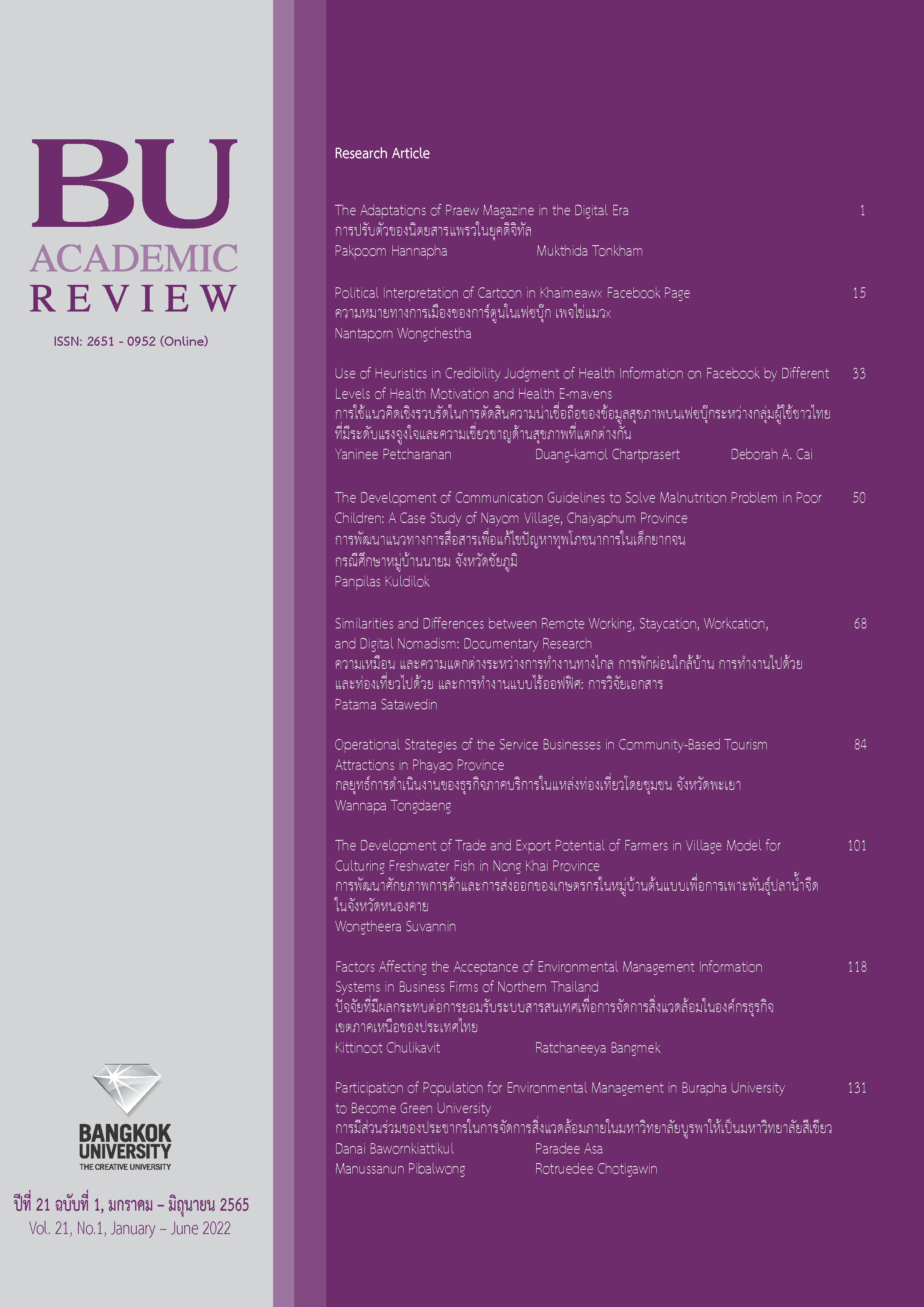การปรับตัวของนิตยสารแพรวในยุคดิจิทัล
Main Article Content
บทคัดย่อ
การวิจัยเรื่องการปรับตัวของนิตยสารแพรวในยุคดิจิทัล มีวัตถุประสงค์เพื่อศึกษาการปรับตัวของนิตยสารแพรวในยุคดิจิทัล และศึกษาปัจจัยที่ทำให้นิตยสารแพรวอยู่รอดในยุคดิจิทัล โดยใช้ทฤษฎีการบริหารองค์กรสื่อสารมวลชน แนวคิดการสื่อสารองค์กร ทฤษฎีการจัดการเชิงกลยุทธ์ และทฤษฎีการตลาดดิจิทัล มาเป็นกรอบในการวิจัย การวิจัยเรื่องนี้ใช้ระเบียบวิจัยเชิงคุณภาพ โดยการสัมภาษณ์เชิงลึกจากบรรณาธิการบริหารนิตยสารแพรว คุณศิริเพ็ญ ผลัญชัย และวิเคราะห์ข้อมูลจากเอกสาร
ผลการศึกษาพบว่า การปรับตัวที่ทำให้นิตยสารแพรวเพื่อให้อยู่รอดได้ในยุคดิจิทัล มี 4 ด้าน คือ 1) ด้านการบริหารองค์กร 2) ด้านการสื่อสารองค์กร 3) ด้านการจัดการเชิงกลยุทธ์ และ 4) การปรับรูปแบบการตลาด ซึ่งการปรับตัว ต้องปรับทั้ง 4 ด้านพร้อมกันทั้งหมด โดยผู้บริหารรับมือกับการเปลี่ยนแปลงกับการร่วมทุนกับกลุ่มพันธมิตรใหม่ทางธุรกิจ โดยผู้บริหารต้องสื่อสารลงไปยังบุคลากรเพื่อที่จะผลักดันให้บุคลากรพัฒนาศักยภาพไปพร้อมกับองค์กร ส่วนการผลิตมีการลดจำนวนการผลิตเพื่อลดงบประมาณและเปิดให้สั่งจองนิตยสารล่วงหน้าเพื่อป้องกันความเสี่ยง ด้านการตลาดต้องเริ่มทำเว็บไซต์ออนไลน์ร่วมกับแพลตฟอร์มสื่อสังคมต่าง ๆ เพื่อเข้าถึงผู้บริโภค
ส่วนปัจจัยที่ทำให้นิตยสารแพรวอยู่รอดในยุคดิจิทัล มี 2 ปัจจัย คือ ปัจจัยภายใน ได้แก่ ปัจจัยการบริหารองค์กร ค่านิยมขององค์กร วัฒนธรรมองค์กร ภาวะผู้นำ ความเป็นเจ้าของนิตยสาร และการสื่อสารองค์กร ด้านปัจจัยภายนอก ได้แก่ การหาพันธมิตรทางธุรกิจที่มีความพร้อมในด้านเงินทุนและมีความเชี่ยวชาญในการดำเนินธุรกิจ รวมถึงมีสถานะทางการเงิน และสายสัมพันธ์ที่ดีกับกลุ่มธุรกิจที่หลากหลาย ยังช่วยเพิ่มความเชื่อมั่นในการดำเนินธุรกิจได้ และมีปัจจัยด้านเทคโนโลยีที่มีการพัฒนาอย่างไม่หยุดยั้ง และมีการสร้างสรรค์งานพิมพ์คุณภาพครบวงจรด้วยการผสานงานพิมพ์เข้ากับสื่อใหม่ ๆ ในยุคดิจิทัล
Article Details

อนุญาตภายใต้เงื่อนไข Creative Commons Attribution-NonCommercial-NoDerivatives 4.0 International License.
บทความที่นำมาสมัครลงตีพิมพ์ในวารสารต้องไม่เคยได้รับการตีพิมพ์เผยแพร่มาก่อน และไม่ส่งต้นฉบับบทความซ้ำซ้อนกับวารสารอื่น รวมทั้งผู้เขียนบทความต้องไม่ละเมิดหรือคัดลอกผลงานของผู้อื่น
เอกสารอ้างอิง
Attanon, N., Phadermkuekulpong, K., Sajja, M., Suphayasarn, T., Tantemsub, N., & Sukko, S. (2017).
Thailai nittayasān Thai [Thai magazine timeline]. Retrieved March 3, 2020, from
https://workpointtoday.com/thai-magazine-timeline/
Bangkok Biz News. (2019, December 18). Khōtsanā pī hoksipsām ding ' thī wī ' sō̜ satsūan tam hāsip
kō̜ kā khrang rǣk [Advertising industry in the year 2020: Collapse of TV advertising industry
with a low proportion of 50% for the first time]. Retrieved February 25, 2020, from
https://www.bangkokbiznews.com/news/detail/858728
Brand Buffet. (2019). Yō̜n dū sip rư̄ang dēn kap kān plīanplǣng ʻutsāhakam sư̄ pī sō̜ngphansipkāo
[A look back at the top 10 news stories on changes of media industry 2019].
Retrieved January 18, 2020, from https://www.brandbuffet.in.th/2019/12/
thailand-media-industry-report-2019/
Buranadechachai, S. (2018). Wārasānsāt lō̜m rūam: nǣokhit lakkān læ kō̜ranī sưksā nai prathēt
Thai [Convergence journalism: Concept principle and case studies in Thailand]. Bangkok:
Danex Intercorporation Company Limited.
Ryan, D., & Jones, C. (2009). Understanding digital marketing, marketing strategies for engaging
the digital generation. London: Kogan Page Limited.
Isranews. (2019, December 30). Sathānakān sư̄ Thai rō̜p pī sō̜ngphanharoyhoksipsō̜ng suit nak fā
mō̜rasum sū ʻōkāt mai] Thailand’s social media trends 2019. Retrieved January 18, 2020,
from https://www.isranews.org/thaireform/thaireform-news/83992-media-83992.html
Jantrawattanakul, D. S., & Permpoon, J. (2014). Lak læ nǣokhit wārasānsāt convergence
[Principles of convergence journalism]. Bangkok: Thai Journalists Association.
Kanlayanee. (2020). Nittayasān khāo [New magazine]. Retrieved January 18, 2020, from
http://kanlayanee.ac.th/wbiprinting/WBI/wbi_7/Lesson/compos_4.htm
Lertdecha, R. (2015). Kān prap tūa khō̜ng nittayasān nai thotsawat thī sō̜ngphansip -
sō̜ngphanyīsip [The adaptation of magazine in 2010 – 2020] (Master’s thesis, Thammasat
University).
McQuail, D. (2005). McQuail’s mass communication theory: An introduction (5th ed.). London:
Sage.
National Statistical Office. (2018). Samrūat kānmī kānchai theknōlōyī sārasonthēt læ kānsư̄sān nai
khrūarư̄an [ICT usage survey Thailand]. Retrieved January 18, 2020, from
http://www.nso.go.th/sites/2014/
Surasonthi, K. (2005). Khwāmrū thāngkān sư̄sān (Phim khrang thī sī) [Introduction to
communication (4th ed.)]. Bangkok: Faculty of Journalism and Mass Communication,
Thammasat University.
Tcijthai. (2019, November 3 ). Sư̄ singphim Thai nai yuk Disrupt [Thailand’s print media in the
disruption era]. Retrieved January 18, 2020, from https://www.tcijthai.com/
news/2019/11/scoop/9541
Thai Post. (2019, December 14). Mai hen patčhai būak ʻemʻai pramœ̄n metngœ̄n khōtsanā pī
hoksipsām titlop nǣ [Not seeing positive factors: “MI” estimates negative advertising
budget in the year 2020]. Retrieved February 25, 2020, from
https://www.thaipost.net/main/detail/52677
Thansettakij. (2019, December 30 ). Sathānakān sư̄ pī hoksipsō̜ng " sut nak fā mō̜rasum sū ʻōkāt
mai " [Thailand’s social media trends 2019: Collapsed, struggled, and new opportunity].
Retrieved March 3, 2020, from https://www.thansettakij.com/politics/417807
Think About Wealth. (2019, May 31). Sathiti phūchai dičhithan thūa lōk sō̜ngphansipkāo Khon Thai
chai tit net māk sut nai lōk [Global digital users statistics 2019: Thailand ranks first].
Retrieved January 18, 2020, from https://www.thinkaboutwealth.com/
digitalstatworld-thailand2019/
Yawiraj, N. (2010). Kānčhatkān samai mai (Phim khrang thī sip) [Modern management (10th ed.).
Bangkok: Triple Group Company Limited.


